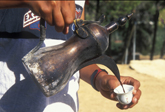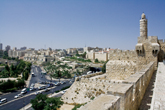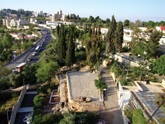×


We have detected your country as:
Please click here to go to the USA website or select another country from the dropdown list.

{image_1}An Israeli firm will present senior representatives of Japanese multinational corporation Toyota with the new generation of car development, including software for efficient fuel consumption, technologies for safety management, and driver risk management, etc. In a bid to look into options of cooperation with Israeli companies, the visit to Israel will last about a week.
Continue Reading »
{image_1}Sit inside, in a booth, on a balcony, or on a sidewalk…but wherever you sit, enjoy the taste and the ambience of that wonderful Israeli phenomenon—the coffee shop. They pepper Jerusalem’s landscape; some are ultra-modern while others are tiny and barely recognizable from the street. Whatever the size, all are part of the “coffee culture,” which has taken Israel by storm.
Continue Reading »
{image_1} One of the most beautiful mosaics in Israel, which was discovered 13 years ago in Lod (home to Ben Gurion International Airport) and then covered over, was uncovered a second time and opened to the public for three days in July. The 1,700-year-old mosaic is to be moved to the Israel Antiquities Authority (IAA) laboratories where conservation work will be undertaken for the next two years, after which it will be permanently returned to Lod.
Continue Reading »
{image_1}The Israeli company BioLineRx released the news in July that one of its two compounds—the BL-1040, which repairs damaged heart muscles after cardiac arrest—has been licensed by Ikaria Holdings in a US $282.5 million-deal. Injected into the heart as a liquid, when inside the body, BL-1040 turns into a protective gel scaffold, sheathing the heart muscles and giving them the ability to heal properly. In effect, it enhances the mechanical strength of the heart muscle during recovery and repair.
Continue Reading »
{image_1}Israeli company AfiMilk has developed a new meter that can monitor milk production in real time and online, giving dairy farmers critical information about possible contamination to milk supplies.
Continue Reading »
By Charleeda Sprinkle, Assistant Editor
{image_1}Incessant pounding reverberates as deep caverns are dug for the foundations of new apartment buildings and hotels; pedestrians cautiously walk down torn-up streets; and buses are rerouted to accommodate revised construction schedules. What a mess! God’s great city, Jerusalem, is undergoing a makeover!
Continue Reading »
{image_1}Seventy-one US Senators sent a letter to US President Barack Obama asking him to encourage and pressure Arab states to consider “dramatic gestures” toward Israel in order to show their commitment to peace with the Jewish state. In their letter, the senators—Democrats and Republicans—detailed steps taken by Prime Minister Benjamin Netanyahu in order to signal Israel’s commitment for peace with the Palestinians and the entire Arab world.
Continue Reading »
By Chris Eden, BFP South Africa National Director
{image_1}He will set up a banner for the nations, and will assemble the outcasts of Israel, and gather together the dispersed of Judah from the four corners of the earth (Isa. 11:12, NKJV).
Continue Reading »
{image_1}Two Israeli companies—Medigus, experts in the miniaturization of diagnostic and surgical tools, and Tower Semiconductor, a leading specialty semiconductor manufacturer and image sensor provider—have collaborated to produce the world’s smallest medical video camera.
Continue Reading »
{image_1} Most Jerusalemites identify the Sultan’s Pool as a venue where large cultural events are held [outside the Old City walls down from Jaffa Gate]; however, for hundreds of years, it was one of the city’s most important water reservoirs. In an archaeological excavation the Israel Antiquities Authority (IAA) recently conducted prior to the construction of the Montefiore Museum, an aqueduct—originally built by Herod—was uncovered that conveyed water to the Temple Mount and also served as the principal water supply to the Sultan’s Pool.
Continue Reading »All logos and trademarks in this site are property of their respective owner. All other materials are property of Bridges for Peace. Copyright © 2025.
Website Site Design by J-Town Internet Services Ltd. - Based in Jerusalem and Serving the World.